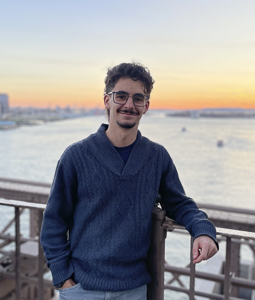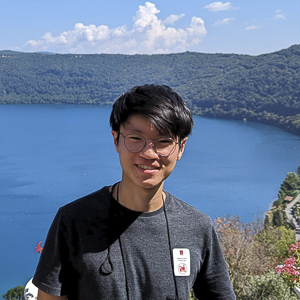The John J. Byrne Jr. Prize in Mathematics
We are now accepting applications for the 2025 Byrne Prize. Graduating math majors planning to go to graduate school are eligible.
The John J. Byrne Jr. Prize in Mathematics is a \$35,000 fellowship that recognizes the top Dartmouth graduating mathematics major interested in continuing mathematics at the graduate level. It is expected to cover tuition for the first year of graduate studies in mathematics or a related field. The prize was established in 2019 and it is awarded every year.
Applications are typically due around the end of the fall term. They consist of an online form filled by the applicant (requires login under your Dartmouth Google account) and a nomination letter from a faculty member, submitted directly to the Byrne faculty advisors, explaining why you are a suitable candidate for this award.
Byrne Prize winners
2025: Mario Tomba Morillo ’25

2024: Paul Shin ’24

Growing up, I did not know that I wanted to study math. It was a mathematics course that I took outside of high school that first piqued my interest, and subsequently a research project in enumerative combinatorics at the College of Lake County that gave me my first taste of what mathematics as a career would be like, and motivated me to dive into the subject as soon as I came to Dartmouth. I was initially drawn by the high degree of abstraction and precision that has characterized the subject for the past century, but over the years through coursework and conversations with my peers and professors, I came to appreciate the beauty in the ideas and intuition underlying these abstractions, as well as the many instances in which highly sophisticated mathematics plays an essential role in other subjects. In the summer following my third year, I participated in an REU at Northwestern, studying a certain class of smooth dynamical systems called Anosov diffeomorphisms that exhibit chaotic behavior. It was a wonderful blend of algebra, topology, geometry, and pretty pictures that I very much enjoyed, along with the surprising connections between dynamics and number theory that I had learnt through the summer school and seminar talks.
I am now entering my first year as a graduate student at the University of Chicago, which I will be spending taking classes and finding an advisor with whom to work for the next several years. While my current interests and background lie mainly in analysis and dynamics, I plan on staying open my first year to see what other topics and problems may interest me. I'm incredibly grateful for the wonderful education and mentorship that I received at Dartmouth, and I'm excited to continue to develop my understanding of mathematics over the coming years in Chicago.
— Paul Shin ’24
2023: Athina Avrantini ’23

I was definitely a huge math nerd in high school; I participated in math competitions and spent my summers at various math camps, where I got a first glimpse of what mathematics beyond calculus looks like. When I came to Dartmouth, majoring in mathematics felt like the natural choice. The math classes I have taken here have reinforced my enthusiasm for the subject and have helped me develop mathematical maturity. During my sophomore summer, I was part of the math department’s Summer Hybrid Undergraduate Research (SHUR) project, where I studied phenomena in the intersection between low dimensional topology and contact geometry. I am currently working with Professor Asher Auel on a senior thesis investigating cyclic error-correcting codes. In particular, we are interested in whether the class of quadratic residue codes is asymptotically good. I am really enjoying the interplay between abstract algebra, number theory, and coding theory involved in my thesis work. I have also participated in the department’s Directed Reading Program, where I studied elliptic curves, and I am involved with Dartmouth’s chapter of the Association of Women in Mathematics. Over the summer, I was a counselor at the Ross Mathematics Program, where I helped teach number theory to a group of advanced high school students. I am now in the process of applying to PhD programs, and I am immensely grateful for the Byrne Prize and the support I have received from the math department in the pursuit of this goal. I am looking forward to the opportunity to stay involved with math, especially in the areas of algebra and number theory.
— Athina Avrantini ’23
2022: Zachary Couvillion ’22

I am currently a mathematics PhD student at Cornell University. I have developing interests within algebra and number theory. In particular, I intend on studying Galois representations and applications to inverse Galois theory. I am grateful for the math department at Dartmouth and the Byrne Prize for helping me realize this goal.
I had entered Dartmouth very unsure about what my major would ultimately be. While I always had a sense that I enjoyed math, I initially thought of it as a tentative major as I explored several subjects in my first year of college. As I took more courses, I started to gain a better understanding of what mathematics is. In particular, math demonstrates the power of abstraction, and learning how the theory can strip away all but the most essential features of a problem left a strong impression on me. I would say that the algebra track at Dartmouth made a particularly strong impact on my future research interests. Beyond coursework, I worked on a team of two other students at the Ursinus College REU on a project in representation theory, specifically concerning representations of a particular affine Lie algebra. At Dartmouth, I studied specializations of Belyi maps with Professor Voight. I received excellent mentorship and support from the math department at Dartmouth, and I am excited to continue this journey in mathematics.
— Zachary Couvillion ’22
2021: Jacob Swenberg ’21

When I came to Dartmouth, I didn’t know that I wanted to do math for a living. Math was one of many interests I had when I started at Dartmouth. I quickly realized, however, that I could not go a term without taking a math class. With each math class I took, I became more convinced that I wanted to pursue math as a career. I ended up taking on a research project in number theory that evolved into my senior thesis project. I also worked on a project in knot theory related to questions about causality in general relativity. These research opportunities convinced me that going to graduate school would be the best way to start a career as a mathematician. I’m currently a graduate student at the UCLA Department of Mathematics, studying number theory and algebraic geometry. In addition to coursework and teaching, I help organize a number theory learning seminar for graduate students, where we’ve discussed topics such as class field theory, Iwasawa theory, and étale cohomology. I’m very excited to continue this mathematical journey, and I couldn’t have done it without the support of Dartmouth’s Math Department, especially my thesis advisor, Professor John Voight.
— Jacob Swenberg ’21
2020: Matthew J. Radosevich ’20


I lived in Laramie, Wyoming from the time I was born until I left to come to Dartmouth for college. I first started to really enjoy math in high school. I had a great teacher for three years who worked hard to show us all how interesting math could be. I was tentatively interested in the math major at the start of my freshman year here, and more broadly interested in many subjects. After a few math classes, I was convinced to dive into the major. Since then I've been taking many math classes, focusing on the pure math side of things. I've also been able to tutor, grade, and act as a teaching assistant. I started my first experience with math research my junior fall, researching Euclidean triangle groups with Professor John Voight. The research blossomed nicely, and we've continued to work on it together for the past two years. We are now almost finished with the project, "Belyi Maps and the Euclidean Triangle Groups", which I will soon present as my senior honors thesis. It has been a truly engaging and interesting project for me. It has tied together material from almost all my math classes at Dartmouth, giving me a good sense of broad connections as well as a deep particular knowledge of this subject. We approach the topic from many angles, from simple geometric, visual reasoning to more abstract group and field theory. The project also has a computational component, and I've been able to get some experience coding and using computer algebra systems.
Outside of the classroom, I like to get out into the outdoors. I was captain of the club Nordic ski team at Dartmouth for three years, and a leader in the Outing Club. I also spent two summers working here in New Hampshire performing trail construction and maintenance on Dartmouth's network of trails between Hanover and Mount Moosilauke. After graduation, I plan to take a gap year, then to continue studying math in graduate school. I will have to do some work between now and then to decide where I'll go and what area in particular I will focus on, but I'm looking forward to the opportunity to keep engaging with math.
— Matt Radosevich ’20
2019: Shikhin Sethi ’19

In addition to receiving the Byrne Prize, Shikhin also received the Francis L. Town Scientific Prize for his achievement in Mathematics while at Dartmouth. During his time as an undergraduate, Shikhin worked with Professor Peter Doyle on projects involving topology, algorithms, and probability.
Shikhin is currently a graduate student in the Department of Mathematics at Princeton University with continuing interests in low-dimensional topology and geometry, and some combinatorics.

